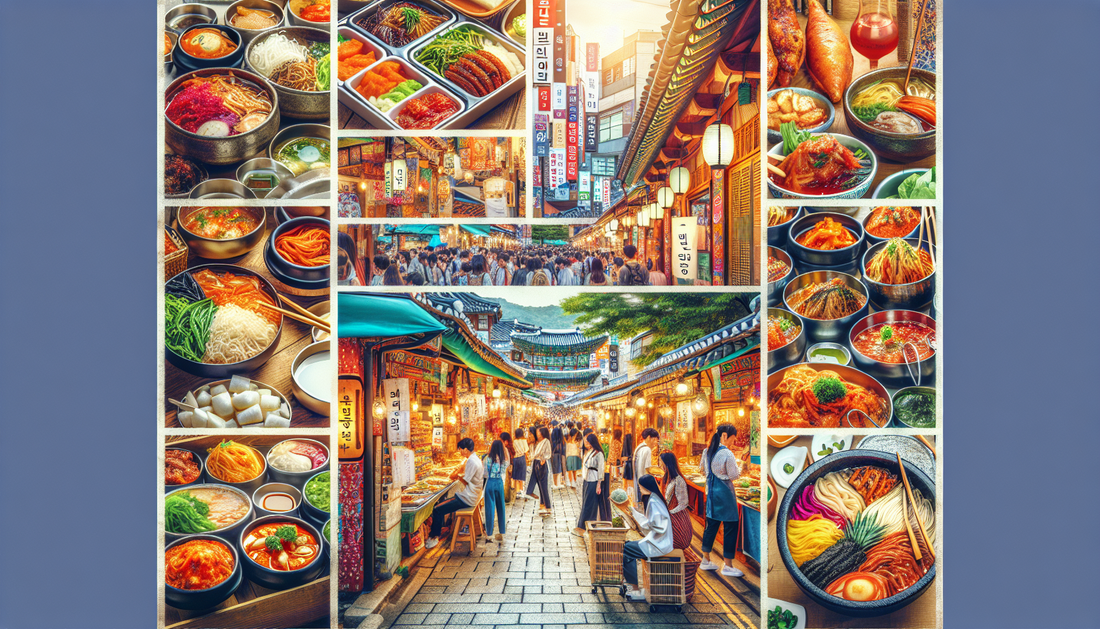
Explore Jeonju: South Korea's Culinary Capital Rich in Flavor
WonderBites Food&TravelShare
Nestled in the heart of South Korea, Jeonju stands out as a must-visit destination for food lovers worldwide. Known as the country's culinary capital, this vibrant city tantalizes taste buds with its rich cultural heritage and diverse flavors. Visitors to Jeonju can embark on a gastronomic journey filled with traditional dishes and modern interpretations.
- 🍲 Bibimbap Haven: Jeonju is famed for its bibimbap, a traditional rice dish mixed with a variety of vegetables, gochujang (chili paste), and sliced meat. It's a symbol of Jeonju's culinary excellence.
- 🏛️ Hanok Village: Experience updated traditional Korean architecture at the Jeonju Hanok Village, where over 800 traditional houses offer a glimpse into Korea's history. The village is a great place to savor the local street food.
- 📅 Jeonju International Film Festival: Annually in late April, Jeonju hosts the Jeonju International Film Festival, an event that showcases independent films, attracting creatives from all over the world.
- 📍 Makgeolli Streets: Don't miss the traditional Korean rice wine, Makgeolli. Jeonju's streets are lined with Makgeolli houses, where visitors can enjoy this drink paired with delicious side dishes.
With its blend of historical charm and innovative cuisine, Jeonju is more than just a city; it's an unforgettable culinary adventure. 🍜
Jeonju, a city located in the North Jeolla Province of South Korea, stands as a cultural beacon celebrated for its vibrant culinary scene and traditional Korean charm. As part of South Korea's burgeoning food revolution, Jeonju has been spotlighted by many travelers, both locals and internationals, seeking an authentic Korean gastronomic experience. The bustling food stalls and centuries-old traditions make this city a must-visit for anyone with a love for food.
Perhaps the most famous culinary offering from Jeonju is its bibimbap, a delightful mix of rice, vegetables, eggs, and meat, which has become a signature dish not only in Jeonju but across South Korea. Renowned for its unique flavors, Jeonju-style bibimbap distinguishes itself through the use of local ingredients and traditional culinary techniques. The dish embodies a perfect balance of taste and nutrition, drawing food enthusiasts from all corners of the world.
Jeonju’s culinary culture is deeply intertwined with its historical roots. The city is home to numerous family-run restaurants and eateries that have preserved age-old recipes, handed down across generations. This preservation is evident as one strolls through Jeonju Hanok Village, a cultural enclave showcasing the city's architectural splendor, where these family-run establishments maintain the integrity of their offerings, drawing both tourists and locals alike.
Among the treasure trove of eateries, Gajok Hwegwan stands out as one of the city's culinary landmarks. Located near Jeonju Hanok Village, this restaurant is acclaimed for its devotion to crafting authentic bibimbap. Each bite tells a story of meticulous preparation, with locally sourced ingredients melding seamlessly to create a dish that is both a feast and a celebration.
Exploring Local Flavors in Jeonju
Beyond bibimbap, Jeonju boasts a variety of culinary delights that tantalize the senses. A visit to the Nambu Market is a sensory expedition where the aroma of freshly made Jeonju-style choco pies fills the air. These traditional delicacies, often indulged as street food, offer a decadent taste that's truly Jeonju. Another must-try is kongnamul gukbap, a hearty soybean sprout soup complemented with rice, favored for its light yet comforting nature.
Jeonju's Street Foods: A Journey of Flavors
Jeonju's street markets burst with vibrant food stalls serving everything from savory pancakes (pajeon) to sizzling hotteok, a sweet Korean pancake filled with sugar, cinnamon, and nuts. The bustling energy of these markets creates an atmosphere that's about more than just food; it's about experiencing the pulse of Jeonju’s culture through taste.
Hanok Village not only serves as a central cultural hub but also as the heart of Jeonju’s food scene. Its cobblestone streets are lined with rustic teahouses and cafes offering traditional Korean teas and sweets. This fusion of historical charm and modern flavors creates an enchanting yet authentic experience for visitors.
The essence of Jeonju’s culinary culture is inextricably linked to its heritage. The annual Jeonju Bibimbap Festival celebrates this, attracting countless food lovers who gather to partake in cooking demonstrations, taste-tests, and vibrant food-themed entertainment. The festival showcases Jeonju's rich food culture and the city's passion for preserving its culinary heritage.
Learning from the Masters: Cooking Classes in Jeonju
For those who wish to take a piece of Jeonju's culinary tradition home, cooking classes offer an immersive experience into Korean cuisine. These classes, often hosted by local chefs and culinary experts, provide hands-on workshops covering foundational Korean dishes. Participants leave not only with full stomachs but also with invaluable skills that allow them to recreate authentic Jeonju flavors in their kitchens.
Classes generally highlight the importance of fresh, seasonal ingredients and traditional cooking techniques. The personal attention from seasoned chefs makes for an enthusiastic and educational experience, exposing participants to the nuances of Korean culinary arts. Such opportunities allow travelers to engage with the cultural tapestry of Jeonju on a deeper level.
A Haven for Culinary Enthusiasts
Jeonju’s allure lies not just in its food but also in the stories that each dish brings to life. Individuals from all walks, including chefs, travelers, and gourmets, converge in Jeonju, driven by a shared passion for culinary exploration. The city’s welcoming nature and its dedication to food culture make it a haven for those seeking both inspiration and an authentic Korean experience.
In the grand tapestry of South Korea's culinary landscape, Jeonju stands out like no other. It’s a city where history and modernity interlace to create a culinary stage celebrated by all who visit. This foodie paradise continues to charm, capture hearts, and lure epicureans, offering a taste adventure through its traditional flavors and innovative dishes that define its essence.











